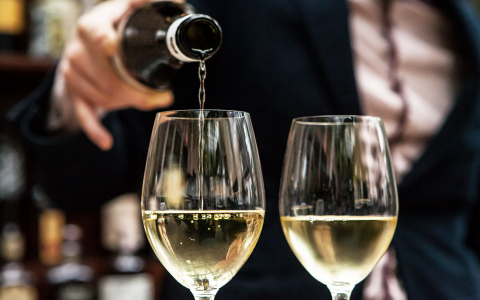
(Wine Spectator) When it comes to unwinding after a long, stressful day, many find that a glass of red wine is just the thing. Now researchers from the University at Buffalo and Xuzhou Medical University in China have found evidence that there may be a scientific reason. Their study suggests that resveratrol, the polyphenol found in plants, including the skins and seeds of wine grapes, that’s already known for its anti-inflammatory and antidepressant properties, may lower stress by inhibiting the expression of a brain enzyme.
Depression and anxiety are among the leading causes of disability in the U.S., according to the National Institutes of Health. Depression affects about 16 million people while anxiety affects some 40 million, according to the Centers for Disease Control and Prevention.
And as the authors of the new study, published in the journal Neuroscience on July 15, point out: The root causes of depression and anxiety are still largely unknown. Pharmacological treatment, therefore, remains a work in progress.
The most commonly prescribed treatment for depression and anxiety is a class of medications called selective serotonin reuptake inhibitors (SSRIs), which increase the levels of the neurotransmitter serotonin in the brain by blocking its reabsorption. A newer class of medications, serotonin and norepinephrine reuptake inhibitors (SNRIs), also block the reabsorption of a second neurotransmitter, norepinephrine.
Both types of medication are widely prescribed, but a National Institute of Mental Health–funded study of the efficacy of antidepressants found that the remission rate was just 31 percent after 14 weeks and 65 percent after six months.
Dr. Ying Xu, an associate research professor at the University at Buffalo’s School of Pharmacy and Pharmaceutical Sciences and a co-leading author of the study, along with Dr. Xiaoxing Yin of Xuzhou Medical University, thinks treatment could be better, and that resveratrol could be an answer. “Resveratrol may be an effective alternative to drugs for treating patients suffering from depression and anxiety disorders,” Dr. Xu said in a statement.
The notion that compounds found in red wine might alleviate symptoms of depression and anxiety has been gaining ground in recent years. A 2015 study found that resveratrol could reduce stress- and depression-related inflammationin the brain. And a 2013 study by a group of doctors in Spain found evidence that wine drinkers suffer from lower rates of depression overall. Last year, researchers at the Icahn School of Medicine at Mount Sinai Hospital in New York found that two other grape compounds, DHCA and mal-gluc, might mitigate stress-induced depression via newly observed neurological processes.
What the new study has found is a relationship between resveratrol and the stress-related hormone corticosterone in mice (cortisol in humans). Normally, cortisol helps our bodies regulate stress. When our stress level spikes, our bodies release cortisol to help us manage it. But when we experience a high level of stress over a sustained period of time, the high, constant flow of cortisol can lead to depression and anxiety.
The researchers found that mice with excessive amounts of corticosterone circulating in their brains also produced the enzyme phosphodiesterase 4, or PDE4, which seemed to cause depressive and anxious behavior. They also found evidence that an elevated level of PDE4 suppressed an important messenger molecule called cyclic adenosine monophosphate (cAMP), which regulates intracellular communication in the brain and, when suppressed, can lead to unwanted neurological changes.
However, a dose of resveratrol seemed to inhibit the expression of PDE4, thereby curbing its depressive effects on the mice's brains and activating the cAMP signal pathways that help maintain healthy brain function.
So do these findings mean you should immediately guzzle copious amounts of red wine in order to ward off depression? Certainly not. For one thing, the researchers used a dose of resveratrol much higher than a person could safely drink in a sitting. But the study findings could lead to new treatments for people in need of an assist. That’s something to toast.



